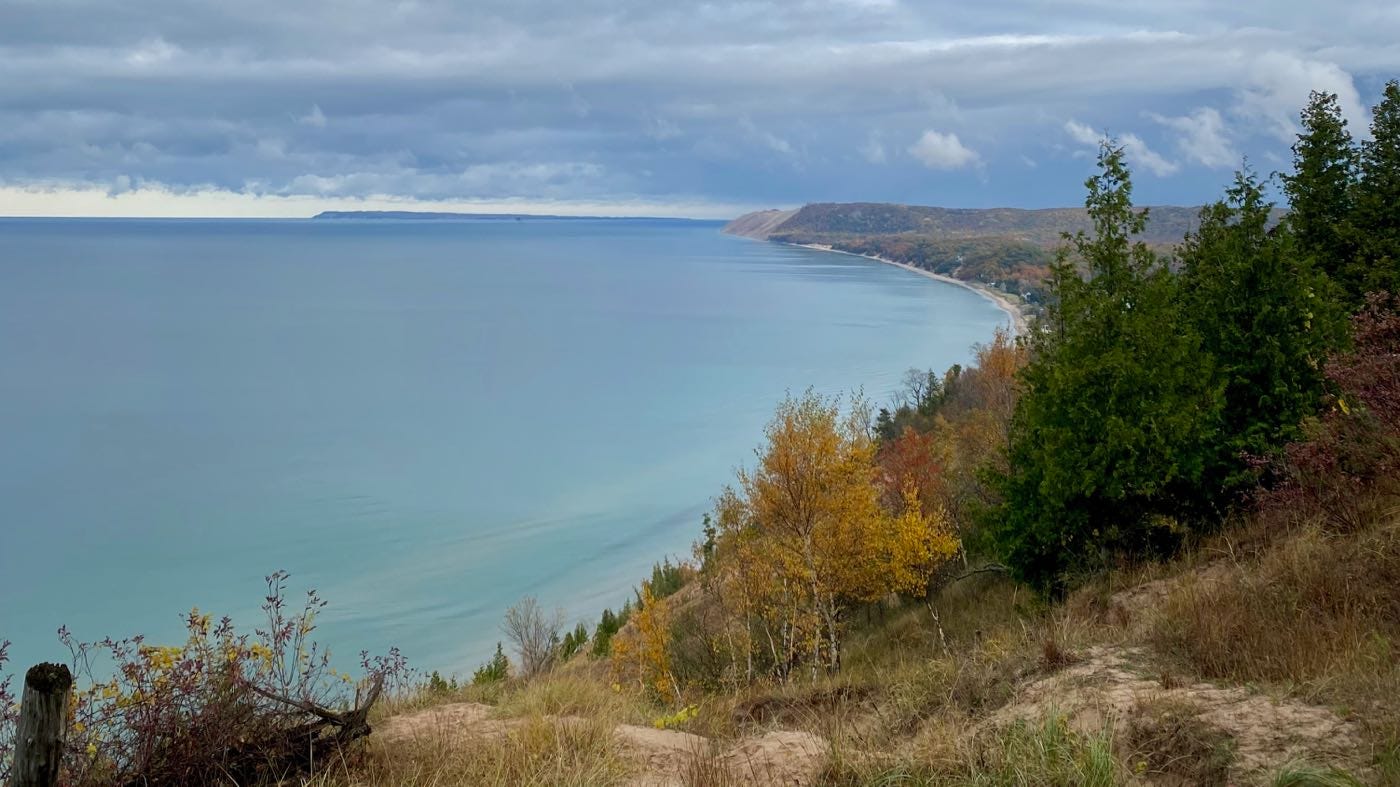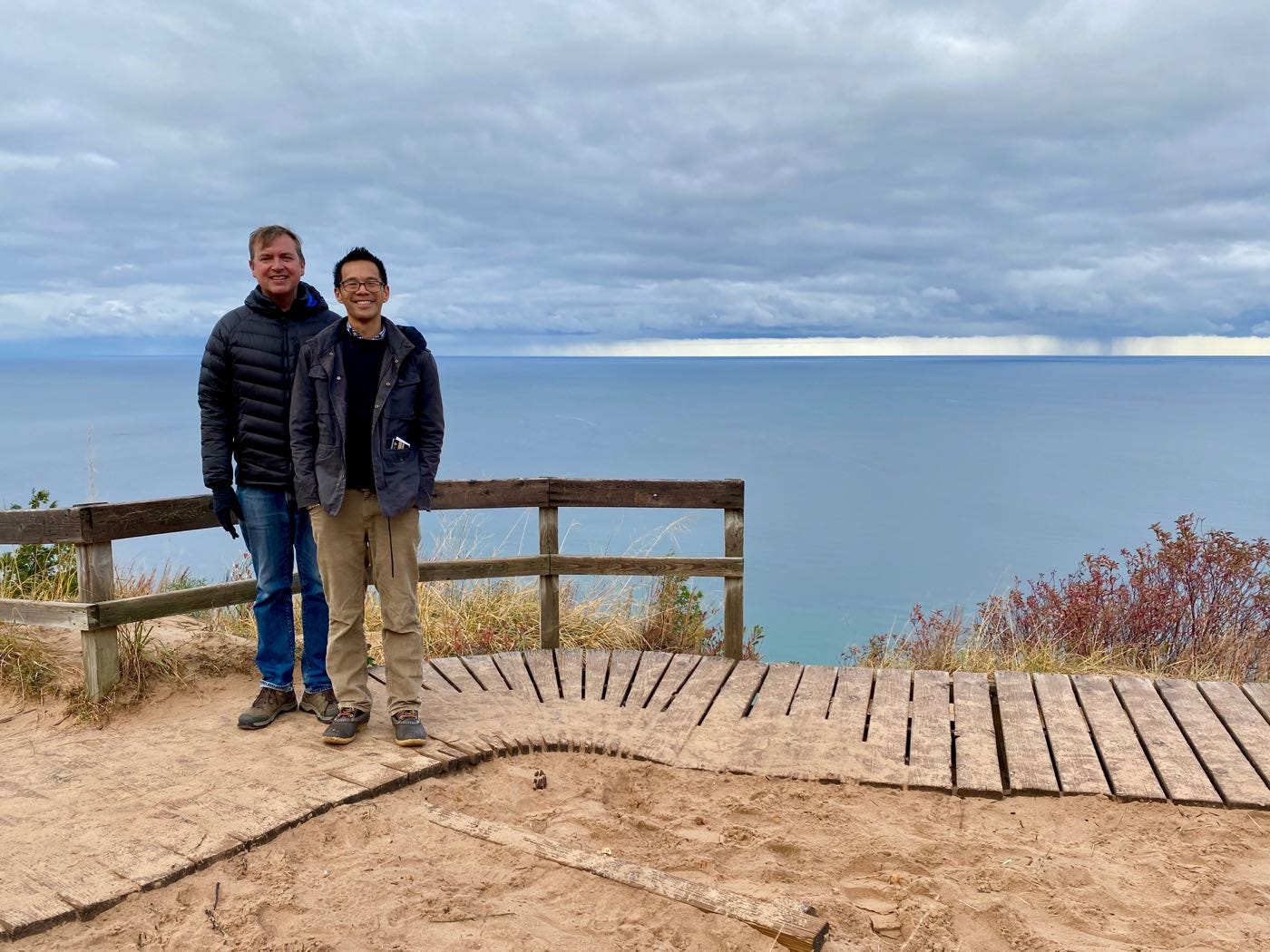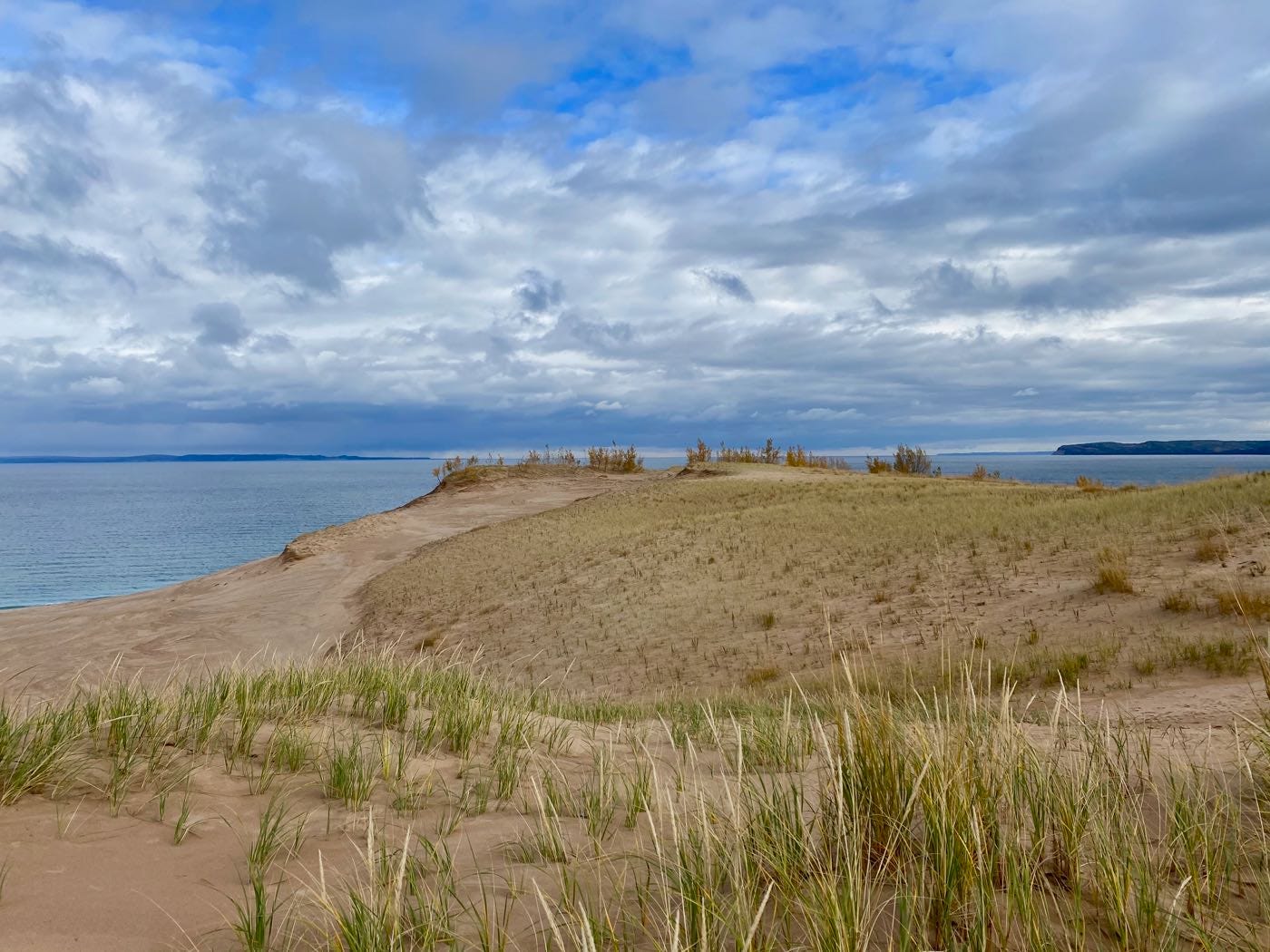What Is Our Pleasure?
Some fragmented thoughts on the love and sorrow of a dead mama bear, hiking in the dunes, quaking aspen trees, and apples and pears
The 142nd Day after Coronatide*
Leelanau Peninsula, Michigan
Hello, reader!
A story to start, not my own but one handed down through generations of the Ojibwa: In the land that we now call Wisconsin, an all-consuming fire once drove Mishe Mokwa (Mother Bear) and her two cubs into the waters of the great lake. They began swimming toward the east. But the journey was long and, for the little cubs, ultimately too taxing. The waters swallowed them shortly before they reached shore.
Mother Bear had managed to drag herself onto dry land. To get a better view of the water, she ascended the lakeside bluff and fixed her eyes westward, searching the horizon for her cubs. Night and day, night and day, she sat in anticipation. But hope turned to grief and vigil gave way to mourning. She died.
In sorrow and sympathy, Gitche Manitou (Great Spirit) raised up two islands, which we now call North Manitou and South Manitou, where the bear cubs had drowned just offshore. And in recognition of her maternal devotion, Gitche Manitou covered Mother Bear with a thick blanket of soft sand, an eternal shroud that we now call Sleeping Bear Dune.

Tristan and I visited Sleeping Bear Dunes National Lakeshore for the first time on Tuesday morning. We delighted in the varied landscape. We hiked two trails, which took us through the woods—hemlock, oak, maple, beech—and across windswept dunes, with the turquoises, greens, and grays of Lake Michigan never far from view. The weather reports had promised cloudy skies, but we lucked into unexpected moments of clarity and blue, and the sunshine was just warm enough to blunt the bite of the autumn wind. Just east of the shoreline, the forest canopy blazed with the yellows, oranges, and reds of the fast-changing trees, like a multicolored afghan ready for Mother Bear in case she needed it.

The backdrop of love and loss in the Ojibwa legend felt right to me on multiple levels.
There has been so much grief and loss throughout this year, and as I’ve written before, we can name these without ranking them. Some of us have lost friends and relatives. Many of us have lost work and income, the old rhythm of a regular day and the freedom to gather as we once did. Most of us have lost any sense of certainty regarding the future or any idea of what “normal” might be a month or a year from now.
As we hiked, Tristan mentioned how grateful he is for our national-park system. While I’m also grateful, my gratitude is also tinged with the sad acknowledgment of a reality: We needed these parks to be demarcated because we couldn’t otherwise be trusted with loving care of the land.
The Ojibwa, like so many Indigenous peoples around the world, had no concept of private land ownership. They believed in the right to roam, the right to hunt, the right to gather—and the responsibility to steward the land, which accompanied those rights. This is not to say that they inhabited some tranquil state of pacifist perfection; even in precolonial times, different peoples fought bloody battles over territorial control. But deeds and fixed boundary lines and property ownership—these concepts arrived with the settlers.
Without those new concepts, the 1872 legislation that established Yellowstone, the first national park in the United States, wouldn’t have made any sense. That law declared the land “hereby reserved and withdrawn from settlement, occupancy, or sale under the laws of the United States, and dedicated and set apart as a public park or pleasuring-ground for the benefit and enjoyment of the people.” It’s fair to ask who is included among “the people.” And the idea of land as “pleasuring-ground” reflects a commodified understanding of the land, whose default purpose would have been some sort of exploitation.
This part of Michigan’s coast was, for the most part, appreciated by early European visitors for what it could give up—timber, fur, fertile soil for growing crops—rather than for what it was. They weren’t here to enjoy the scenery or to learn the stories that the land and the people who lived here before carried with them. The 111 square miles of Sleeping Bear Dunes were only set aside as a “pleasuring ground” in 1970.
I have to hope that we’re developing a deeper, more holistic understanding of pleasure. Sure, fun is important, as is respite. But can “pleasure” also delight in story? Can it honor history? Can it see the health of the land and creature, including people, as inextricably intertwined? Can it not just conserve and preserve but also rehabilitate and reconcile? I guess it’s because I believe in a God of second, third, and fourth chances that I’m constantly looking for evidence of this kind of hope in the world around me, and you can chalk it up to confirmation bias; that’s fine with me. But I can’t see any sense in any kind of pleasure that doesn’t ultimately lead to restoration and wholeness.

One of my favorite moments during our hike came just after we had just crested a small dune and descended into a gentle valley. A strange chattering caught me. To our right was a stand of quaking aspens, their flat, roundish leaves all golden (I think? I did a bunch of Google searches to figure that out, so I could definitely be wrong). Many branches had already been stripped bare—that west wind can really whip off the lake. Yet enough leaves remained to make a ruckus.
I thought of a section of Isaiah 55 that speaks of God’s work that remains unfinished. Yet it is resolute in its hope and in its convictions about abundant life and flourishing. “Yes, you will go out with celebration, and you will be brought back in peace,” it says. “Even the mountains and the hills will burst into song before you; all the trees of the field will clap their hands.”
What do the mountains and the hills sing about, and why do the trees applaud? When the verses were written, the people of Israel were scattered, many of them far from what they considered to be home. The world wasn’t as they wished it to be. They sought salvation.
I can only make sense of the celebration that Isaiah names by understanding it as anticipatory joy. I can only comprehend those songs by hearing some minor and melancholy chords, a passage or two laden with lament, even as the whole moves toward major resolution. Hope has to be realistic to outshout despair, and true joy doesn’t deny sorrow but rather is set against and atop it.
The quaking aspens at Sleeping Bear Dunes stood amidst relatively inhospitable terrain. The slowly shifting piles of sand provided something of a windbreak, but given the elements, it can’t have been easy to put down roots and it can’t have been easy to grow. What died so that these aspens could have life?
Season after season, they’ve done their steady work. And in their applause, what I heard—what I chose to hear—was this: We’ve survived. While winter might be on its way, so is spring. And, God willing, we’ll be here to greet them. We’re still here.
What I’m Growing: Nighttime temperatures over the next few days will drop just about to freezing over the next several days. I’ve still got some kale and bok choy that can be harvested in my garden plot, and probably enough chard that turned out to be accidental micro greens. This weekend’s work will be to bring in the bamboo stakes and the hose, and to save some seed for next year.
What I’m Cooking: Since we’ve been traveling, I haven’t done much cooking this week. But we stopped at a few farmstands on the Leelanau and Old Mission Peninsulas. I picked up some pears, and a whole bunch of different kinds of apples—Cortland, Macon, Jonathan, Golden Delicious. It’s been a while since I made a tart or a pie, and maybe I’ll can a small batch of applesauce. Any other ideas?
What I’m Reading: One of the most ridiculous things ever to happen to me was that Barbara Brown Taylor asked me to write a blurb for her new sermon collection, Always a Guest, which came out this week. I guess when you’re BBT, nobody is really going to help you sell books, so you can just ask random friends to write a few words for fun. This book features so many gorgeous words, sentences, and paragraphs, and I keep coming back to these sermons to luxuriate in their goodness and wisdom. I’ve told a couple of people that, someday, I hope to write an entire sermon that preaches as much as BBT can in just one sentence. I loved this section, from a sermon on John 12:20-26 that examines Jesus’s image of a single grain of wheat: “I used to think that the gospel truth was something you had to impose on reality—some impossible thing you had to believe so you could choose the way of life. Now I think it’s more about admitting the truth you already know down deep, even if it scares you to death: that when the time comes, you can live small or you can live large. You can hang onto the grain you have or you can gamble it all for love.”
What I’m Listening to: I write best in the morning, and given how late the sun rises here in West Michigan, I’m finding I need to switch my morning playlist to something a little more... moving? Otherwise, I’d just want to crawl back under the covers. Mavis Staples has been a good co-conspirator for these days. Sow good seeds, friends.
Sorry for the tardiness of my correspondence this week. It’s been a full few days, and then last night of course we stayed up too late watching the presidential debate and the post-show analysis. I’m not going to say anymore about that, but if you are a citizen of these United States and you haven’t already, please vote as a way of loving your neighbor.
That’s all I’ve got this week. I’m so glad we can stumble through all this together, and I’ll try to write more again soon.
Yours,
Jeff
*I’m still counting my days from June 1, when my governor, Gretchen Whitmer, lifted Michigan’s stay-at-home order. Someone who shall not be named in this newsletter absurdly suggested last night that life in Michigan has been like living in a prison. It has not. I just hope we will steward our freedom well, wearing our masks and staying safe. This virus has not gone away. Lord, have mercy, and people, be wise.



